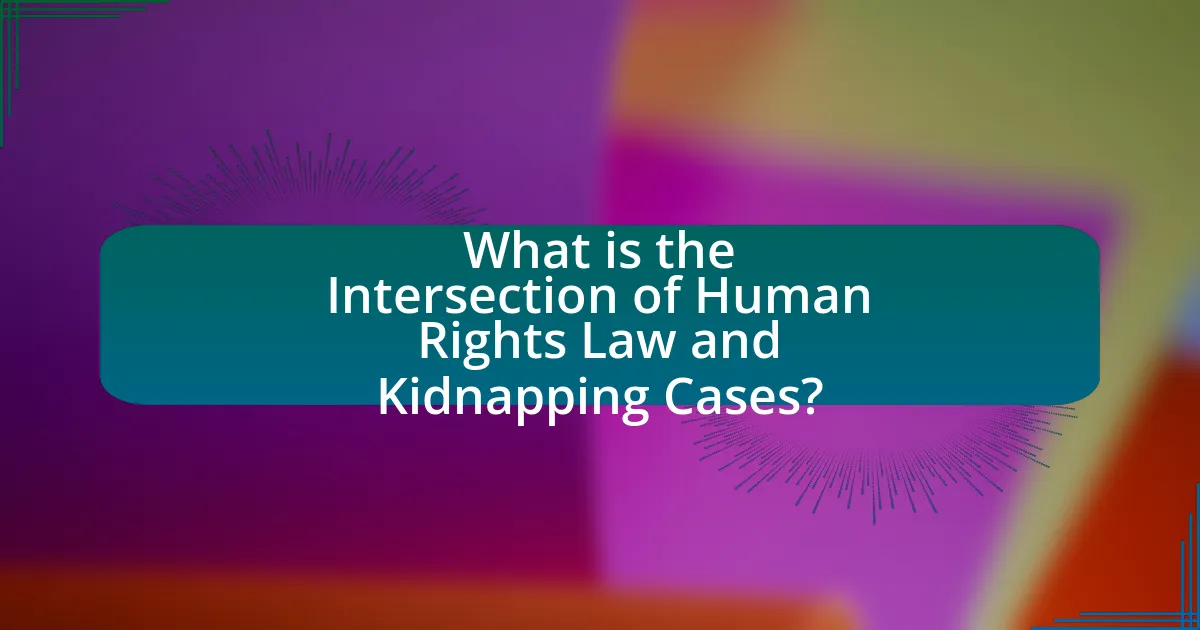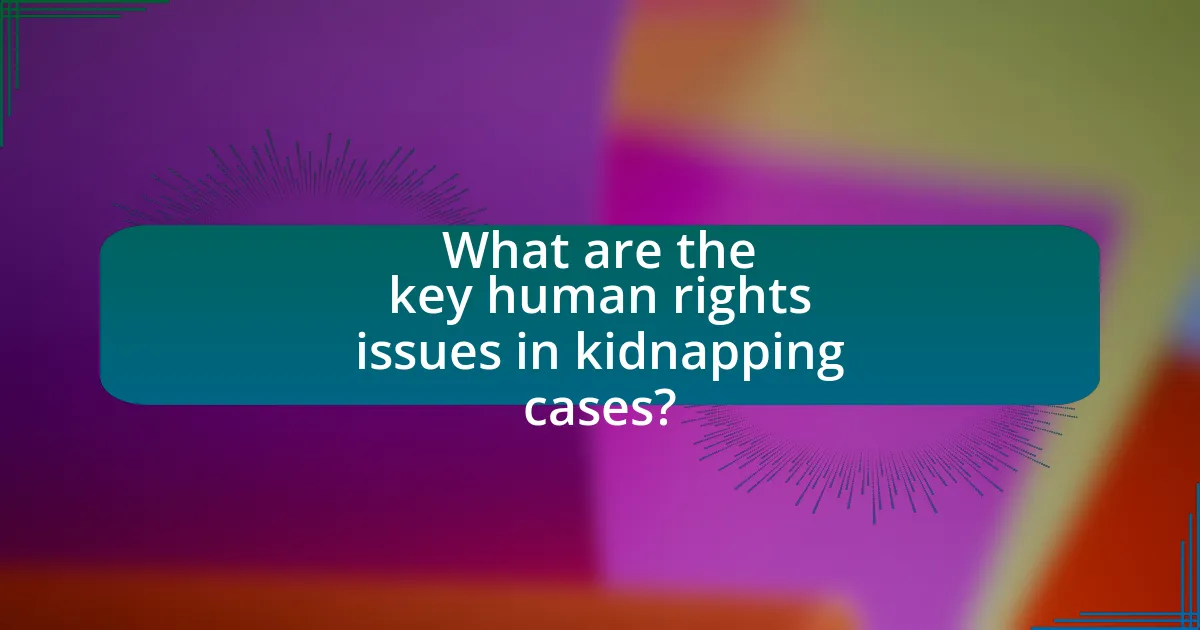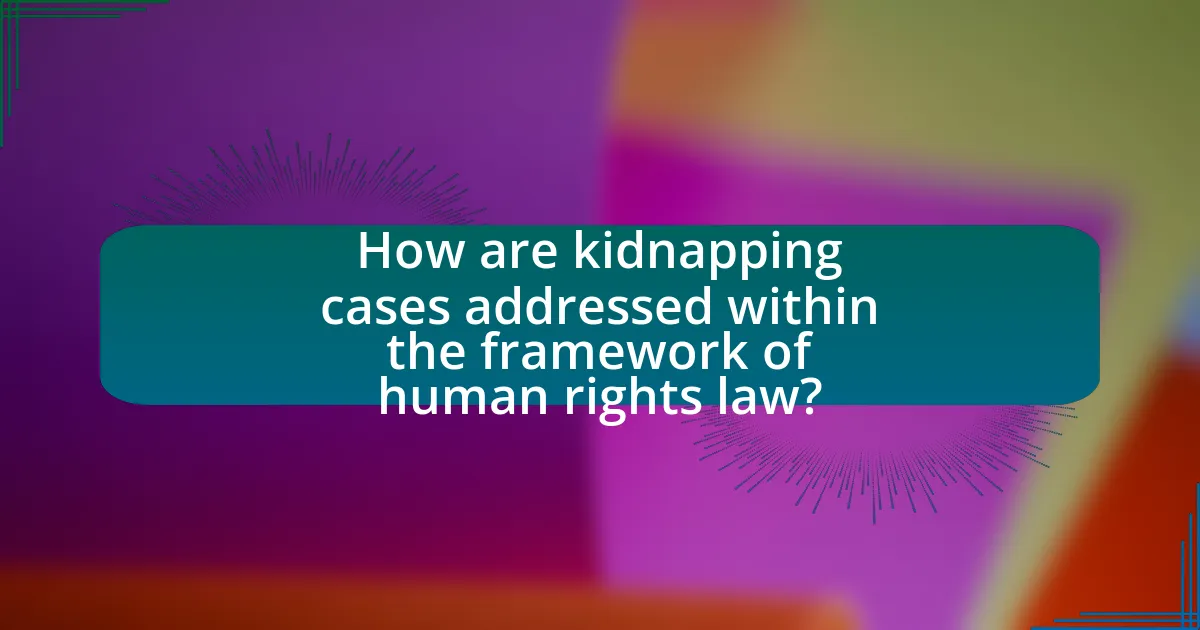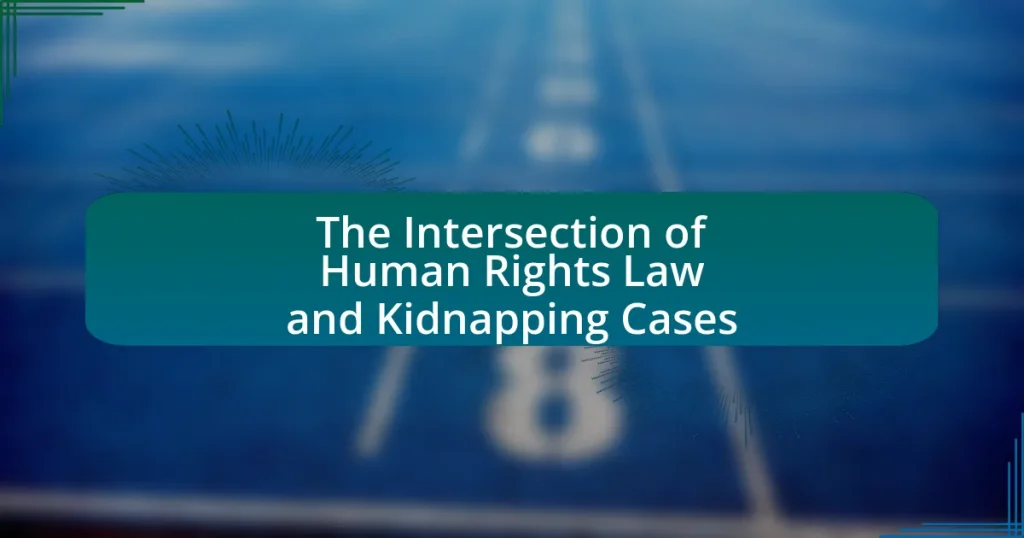The article examines the intersection of human rights law and kidnapping cases, emphasizing the legal obligations of states to protect individuals from unlawful detention and ensure justice for victims. It defines kidnapping within the context of human rights, highlighting international treaties that address this issue, such as the International Covenant on Civil and Political Rights and the United Nations Convention against Transnational Organized Crime. The article also discusses the psychological and social implications for victims, the role of governments in enforcing human rights standards, and the challenges faced in prosecuting kidnapping cases. Additionally, it outlines best practices for legal professionals in advocating for victims’ rights and the resources available to support their efforts.

What is the Intersection of Human Rights Law and Kidnapping Cases?
The intersection of human rights law and kidnapping cases lies in the protection of individuals’ rights against unlawful detention and the obligation of states to prevent and respond to such violations. Human rights law, particularly through instruments like the International Covenant on Civil and Political Rights, mandates that individuals have the right to liberty and security, which is directly violated in kidnapping scenarios. Furthermore, international human rights frameworks require states to investigate and prosecute acts of kidnapping, ensuring accountability and justice for victims. This legal obligation is reinforced by various treaties and conventions that emphasize the need for states to uphold human rights standards, thereby linking the enforcement of human rights law directly to the handling of kidnapping cases.
How do human rights laws define kidnapping?
Human rights laws define kidnapping as the unlawful seizure and carrying away of a person by force or fraud, which violates the individual’s right to personal liberty and security. This definition aligns with international legal frameworks, such as the International Covenant on Civil and Political Rights, which emphasizes the protection of individual freedoms. Kidnapping is recognized as a serious violation of human rights, as it deprives individuals of their autonomy and exposes them to potential harm, thereby contravening the principles of dignity and respect for human rights upheld by various human rights instruments.
What international treaties address kidnapping and human rights?
International treaties that address kidnapping and human rights include the United Nations Convention against Transnational Organized Crime, specifically its Protocol to Prevent, Suppress and Punish Trafficking in Persons, especially Women and Children, and the Hague Convention on the Civil Aspects of International Child Abduction. These treaties establish legal frameworks for combating kidnapping and protecting human rights, emphasizing the need for international cooperation in preventing and addressing such crimes. The UN Convention against Transnational Organized Crime, adopted in 2000, aims to enhance the ability of states to combat organized crime, including human trafficking, which often involves kidnapping. The Hague Convention, established in 1980, focuses on the wrongful removal or retention of children across international borders, providing a mechanism for their prompt return.
How do domestic laws vary in defining kidnapping?
Domestic laws vary significantly in defining kidnapping, with differences often based on jurisdictional interpretations and legal frameworks. For instance, in the United States, kidnapping is generally defined as the unlawful taking and carrying away of a person by force or fraud, while in the United Kingdom, the definition includes the unlawful confinement of a person without their consent. Additionally, some countries may include specific elements such as the intent to hold for ransom or to inflict harm, which can further differentiate their legal definitions. These variations reflect cultural, legal, and historical contexts that shape how kidnapping is understood and prosecuted in different regions.
Why is the intersection of human rights law and kidnapping significant?
The intersection of human rights law and kidnapping is significant because it highlights the legal obligations of states to protect individuals from abduction and ensure justice for victims. Human rights law, including treaties like the International Covenant on Civil and Political Rights, mandates that states prevent violations such as kidnapping, which infringes on the right to personal liberty and security. Furthermore, the enforcement of human rights standards in cases of kidnapping can lead to accountability for perpetrators and provide victims with avenues for redress, thereby reinforcing the rule of law and promoting societal trust in legal systems.
What are the implications for victims of kidnapping?
Victims of kidnapping face severe psychological, physical, and social implications. Psychologically, they often experience post-traumatic stress disorder (PTSD), anxiety, and depression, as evidenced by studies indicating that up to 50% of kidnapping survivors report long-term mental health issues. Physically, victims may suffer from injuries sustained during the abduction or confinement, which can lead to chronic health problems. Socially, they may encounter stigmatization, difficulties in reintegration into their communities, and strained relationships with family and friends. These implications highlight the urgent need for comprehensive support systems and legal protections for victims, as recognized by various human rights organizations advocating for the rights and rehabilitation of kidnapping survivors.
How does human rights law influence the prosecution of kidnapping cases?
Human rights law significantly influences the prosecution of kidnapping cases by establishing legal standards that protect victims’ rights and ensure fair trial procedures. These laws mandate that authorities prioritize the protection of individuals from unlawful detention and ensure that victims receive justice, which can lead to more rigorous investigations and prosecutions. For instance, international human rights treaties, such as the International Covenant on Civil and Political Rights, obligate states to prevent and punish acts of kidnapping, thereby reinforcing the legal framework within which prosecutors operate. This legal obligation compels law enforcement agencies to act promptly and effectively in kidnapping cases, ensuring that the rights of victims are upheld throughout the judicial process.

What are the key human rights issues in kidnapping cases?
Key human rights issues in kidnapping cases include the violation of the right to personal liberty, the right to security, and the right to a fair trial. Kidnapping often results in unlawful detention, where victims are deprived of their freedom without legal justification, infringing upon international human rights standards such as those outlined in the Universal Declaration of Human Rights. Additionally, victims may face physical and psychological harm, which violates their right to security and protection from torture or inhumane treatment. Furthermore, the lack of accountability for perpetrators undermines the right to a fair trial, as victims may not receive justice or reparations. These issues highlight the urgent need for effective legal frameworks and enforcement mechanisms to protect individuals from kidnapping and ensure their rights are upheld.
How does kidnapping violate fundamental human rights?
Kidnapping violates fundamental human rights by infringing upon the right to personal liberty and security. This act forcibly deprives individuals of their freedom, which is protected under international human rights instruments such as the Universal Declaration of Human Rights, specifically Article 3, which states that everyone has the right to life, liberty, and security of person. Additionally, kidnapping often involves physical and psychological harm, violating the right to be free from torture and inhumane treatment, as outlined in Article 5 of the same declaration. The illegal detention and coercion associated with kidnapping further undermine the principles of dignity and respect inherent in human rights law.
What specific rights are infringed upon during a kidnapping?
During a kidnapping, the specific rights infringed upon include the right to personal liberty, the right to security of person, and the right to not be subjected to torture or inhumane treatment. The right to personal liberty is violated as the victim is unlawfully detained against their will. The right to security of person is infringed upon due to the threat and actual harm that may occur during the abduction. Furthermore, international human rights instruments, such as the Universal Declaration of Human Rights, affirm these rights, establishing that any form of kidnapping constitutes a serious violation of fundamental human rights.
How do these violations affect the victims’ recovery?
Violations of human rights in kidnapping cases significantly hinder victims’ recovery by exacerbating psychological trauma and impeding access to necessary support services. Victims often experience heightened feelings of fear, anxiety, and distrust, which can lead to long-term mental health issues such as PTSD. Research indicates that approximately 30% of kidnapping survivors develop PTSD, illustrating the severe impact of these violations on mental well-being. Furthermore, the lack of legal recourse and support can prevent victims from obtaining medical care, counseling, and social reintegration, ultimately prolonging their suffering and complicating their recovery process.
What role do governments play in protecting human rights in kidnapping cases?
Governments play a crucial role in protecting human rights in kidnapping cases by enacting and enforcing laws that criminalize kidnapping, ensuring accountability for perpetrators, and providing support for victims. They establish legal frameworks that align with international human rights standards, such as the International Covenant on Civil and Political Rights, which obligates states to protect individuals from arbitrary deprivation of liberty. Additionally, governments are responsible for conducting thorough investigations into kidnapping incidents, prosecuting offenders, and implementing measures to prevent future occurrences, thereby safeguarding the rights and dignity of affected individuals.
How can governments ensure compliance with international human rights standards?
Governments can ensure compliance with international human rights standards by implementing robust legal frameworks that align domestic laws with international treaties. This includes ratifying key human rights instruments, such as the International Covenant on Civil and Political Rights, and establishing independent monitoring bodies to oversee adherence to these standards. For instance, countries that have integrated the principles of the Convention Against Torture into their national legislation have demonstrated improved accountability and protection of individual rights. Additionally, training law enforcement and judicial officials on human rights norms enhances their capacity to uphold these standards in practice.
What measures can be taken to prevent kidnappings?
To prevent kidnappings, implementing community awareness programs and enhancing law enforcement training are essential measures. Community awareness programs educate individuals about safety practices, such as recognizing suspicious behavior and reporting it, which can deter potential kidnappers. Enhanced law enforcement training focuses on effective response strategies and victim recovery techniques, improving the overall effectiveness of police in kidnapping cases. According to the FBI, areas with active community engagement and well-trained law enforcement report lower kidnapping rates, demonstrating the effectiveness of these preventive measures.

How are kidnapping cases addressed within the framework of human rights law?
Kidnapping cases are addressed within the framework of human rights law primarily through the protection of individual rights, including the right to personal liberty and security. International human rights instruments, such as the Universal Declaration of Human Rights and the International Covenant on Civil and Political Rights, explicitly prohibit arbitrary detention and enforced disappearances, which are often associated with kidnapping. These legal frameworks obligate states to prevent, investigate, and punish acts of kidnapping, ensuring victims’ rights to justice and reparations. Additionally, regional human rights bodies, like the Inter-American Court of Human Rights, have established case law that reinforces the obligation of states to protect individuals from kidnapping and to hold perpetrators accountable, thereby affirming the intersection of human rights law and the issue of kidnapping.
What legal frameworks exist for addressing kidnapping under human rights law?
Legal frameworks addressing kidnapping under human rights law include international treaties, regional human rights instruments, and national laws. The International Covenant on Civil and Political Rights (ICCPR) obligates states to protect individuals from arbitrary deprivation of liberty, which encompasses kidnapping. Additionally, the Convention against Torture and Other Cruel, Inhuman or Degrading Treatment or Punishment prohibits acts of torture and inhumane treatment, often relevant in cases of kidnapping. Regional frameworks, such as the European Convention on Human Rights, also provide protections against unlawful detention. National laws often incorporate these international obligations, creating a comprehensive legal structure to combat kidnapping and protect human rights.
How do international courts handle kidnapping cases?
International courts handle kidnapping cases by applying international human rights law and relevant treaties to ensure accountability and justice. These courts, such as the International Criminal Court (ICC) and regional human rights tribunals, assess whether the acts of kidnapping violate fundamental rights, including the right to liberty and security. For instance, the ICC can prosecute individuals for crimes against humanity if kidnappings are part of a widespread or systematic attack against civilians, as outlined in the Rome Statute. Additionally, regional courts like the European Court of Human Rights can rule on cases where states fail to protect individuals from abduction, emphasizing state responsibility under the European Convention on Human Rights. This legal framework ensures that victims of kidnapping receive justice and that perpetrators are held accountable.
What are the challenges in enforcing human rights laws in kidnapping cases?
Enforcing human rights laws in kidnapping cases faces significant challenges, primarily due to issues of jurisdiction, lack of evidence, and political will. Jurisdictional challenges arise when kidnappings occur across borders, complicating the application of national laws and international treaties. Additionally, the lack of evidence often hampers investigations, as victims may be unable to provide details or may be too traumatized to testify. Furthermore, political will is often lacking in regions where governments may be complicit in kidnappings or where law enforcement is weak, leading to inadequate responses to human rights violations. These factors collectively hinder the effective enforcement of human rights laws in such cases.
What are the best practices for legal professionals in handling kidnapping cases?
Legal professionals handling kidnapping cases should prioritize thorough investigation, victim support, and adherence to human rights standards. They must gather all relevant evidence, including witness statements and forensic data, to build a strong case. Additionally, legal professionals should ensure that the rights of the victim are protected throughout the legal process, providing access to psychological support and legal counsel. It is essential to remain aware of international human rights laws, such as the Universal Declaration of Human Rights, which emphasizes the right to security and protection from arbitrary detention. By following these practices, legal professionals can effectively navigate the complexities of kidnapping cases while upholding the dignity and rights of all individuals involved.
How can legal professionals advocate for victims’ rights effectively?
Legal professionals can advocate for victims’ rights effectively by employing a multi-faceted approach that includes legal representation, public awareness campaigns, and collaboration with support organizations. Legal representation ensures that victims receive proper guidance through the legal system, which is crucial in cases involving human rights violations such as kidnapping. Public awareness campaigns can educate the community about victims’ rights and the legal recourse available, thereby fostering a supportive environment for victims. Collaboration with organizations that specialize in victim support can provide additional resources and advocacy, enhancing the overall effectiveness of legal efforts. This approach is supported by studies indicating that comprehensive advocacy strategies significantly improve outcomes for victims in legal proceedings.
What resources are available for legal professionals dealing with kidnapping cases?
Legal professionals dealing with kidnapping cases can access a variety of resources, including legal databases, specialized training programs, and support networks. Legal databases such as Westlaw and LexisNexis provide comprehensive case law, statutes, and legal commentary relevant to kidnapping laws and human rights implications. Specialized training programs, often offered by organizations like the International Association of Chiefs of Police, focus on best practices in handling kidnapping cases, including legal considerations and victim rights. Additionally, support networks such as the National Center for Missing and Exploited Children offer resources and guidance for legal professionals navigating the complexities of kidnapping cases, ensuring they are informed about the latest legal standards and human rights issues.

